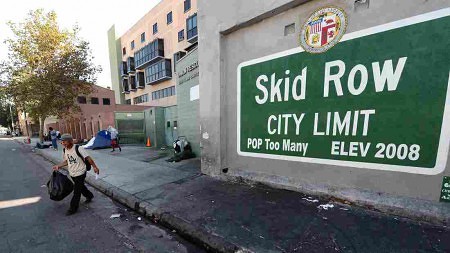 By Rebecca K. Smith, CLDC Board Secretary & Cooperating Attorney
By Rebecca K. Smith, CLDC Board Secretary & Cooperating Attorney
On March 10, 2015, the federal Ninth Circuit Court of Appeals issued a decision in a case called CPR for Skid Row v. City of Los Angeles. CPR is a group that advocates for the rights of people who live in the area of L.A. known as Skid Row. The people who live on Skid Row are mostly the poor and homeless and they have been subjected to an increasing police presence and criminalization of homelessness in recent years.
In July 2011, members of CPR protested a government-sponsored walk through Skid Row that CPR members believed was demeaning and intended to support and promote the criminalization of homelessness. CPR protestors shouted chants, including: “We are not resisting. This is our First Amendment Right.” They also banged on drums, often in close proximity to the participants in the walk-through. Eventually, one of the CPR organizers, who was filming the walk and the protest, was arrested by the LAPD after he allegedly yelled loudly less than a foot away from one of the walk participants. The organizer was arrested for violating a California law against disturbing a public meeting.
The federal appeals court found that the arrest of the organizer was unconstitutional. Even though the California law states that anyone who “willfully disturbs or breaks up” a meeting is guilty of a misdemeanor, there are important exceptions that apply to political protests. When there are “public meetings” in which people “assembl[e] … for the consideration of public questions,” protestors can only be arrested for disrupting a meeting under California law if there are actual “threats, intimidations, or unlawful violence.” In other words, disturbing or breaking up political meetings by nonviolent means is not a crime.
So what does this really mean? It means that if a protestor is at a political protest in California, the police cannot lawfully arrest her for disturbing a meeting under California Penal Code Section 403 unless she is engaging in “threats, intimidations, or unlawful violence.” In other words, a protestor cannot be lawfully arrested under California Penal Code Section 403 if she is participating in a non-violent political protest.
————————————————————————————————————————————————–
Dear Supporters,
This is the first post in a new weekly installment that we hope to provide to you as a public service. Our goal is to translate the law into something that normal people who care about the world can understand and use. We hope you like it. Each week, the staff or board members of CLDC will provide commentary on current legal issues that our members and supporters care about. Give us some feedback! Do you have a topic you want us to cover? Email us and let us know. Got any bright ideas about a name for our new weekly blog? Tell us and we will collect submissions and pick one. Thanks for your support and enjoy our new project.
